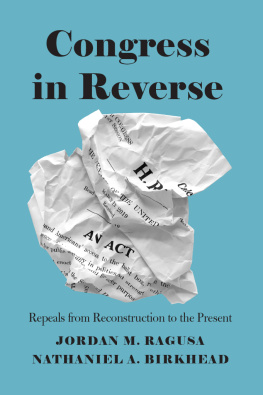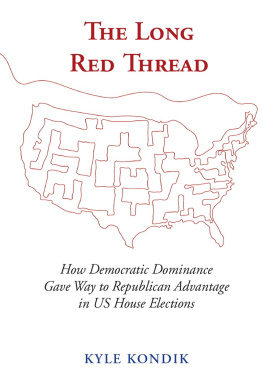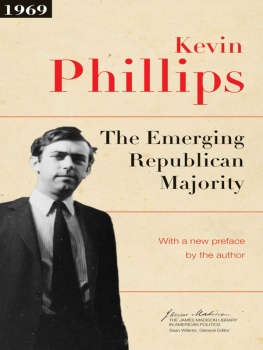THE STRONGHOLD
THOMAS F. SCHALLER
THE
STRONGHOLD
HOW REPUBLICANS CAPTURED CONGRESS
BUT SURRENDERED THE WHITE HOUSE

Copyright 2015 by Thomas F. Schaller.
All rights reserved.
This book may not be reproduced, in whole or in part, including illustrations,
in any form (beyond that copying permitted by Sections 107 and 108 of the
U.S. Copyright Law and except by reviewers for the public press),
without written permission from the publishers.
Yale University Press books may be purchased in quantity for educational,
business, or promotional use. For information, please e-mail sales.press@yale.edu
(U.S. office) or sales@yaleup.co.uk (U.K. office).
Designed by Lindsey Voskowsky.
Set in ACaslonPro type by Westchester Publishing Services.
Printed in the United States of America.
Library of Congress Cataloging-in-Publication Data
Schaller, Thomas F.
The stronghold : how Republicans captured congress but surrendered the White House / Thomas F. Schaller.
pages cm
Includes bibliographical references and index.
ISBN 978-0-300-17203-4 (hardback)
1. Republican Party (U.S. : 1854 )History. 2. Political cultureUnited States. 3. Right and left (Political science)United States. 4. United StatesPolitics and government. I. Title.
JK2356.S296 2015
324.973'093dc23
2014023094
A catalogue record for this book is available from the British Library.
This paper meets the requirements of ANSI/NISO Z39.48-1992 (Permanence of Paper).
10 9 8 7 6 5 4 3 2 1
To Juli and John:
Your big brother loves you. Thanks for giving me
four wonderful nieces.
CONTENTS
PREFACE
It is well known that the Republican Party has struggled in recent presidential elections, losing four of the past six contests, and five of six in the national popular vote. The conventional wisdom is that the modern GOP suffers from two related problems: first, it has lurched too far to the right on key national issues; and second, its shrinking coalition of older, white, married, rural, and male voters is out of touch with the rising American electorate of female, nonwhite, unmarried, urban, and inner suburban voters. These problems are real, but as an explanation for the partys presidential woes they are incomplete.
Meanwhile, national Republicans have been very competitive in congressional elections. Two years after the partys presidential struggles began in 1992, Republicans captured the House and the Senate, ending a forty-year period of Democratic dominance. The GOP controlled both chambers for a dozen years and then, after losing control for two cycles, recaptured the House in 2010. Unlike the previous era of persistent divided Congressesthe first six years of the Reagan administrationwhen John Boehner and his fellow Republicans held the House in 2012, it marked the first time in the partys 160-year history that a Republican Speaker had ruled for more than one term without a companion majority in the Senate.
In this book, I argue that the Republican Party is a Congress-centered and specifically a House-heavy party because congressional Republicans made choices and staked out positions during the post-Reagan era that tended to benefit themselves at the expense of the partys presidential candidates. This shift created a feedback loop between the institution and ideology, in which the GOPs power became more concentrated in Congress as the party became more conservative, and the party became more conservative as it became more anchored to Capitol Hill. Because conservative Republicans in Congress have paid little electoral price for their policy positions and political choices, they quite rationally moved the party ever rightward. Its no coincidence that the partys ideological self-marginalization has coincided with its growing strength in Congress, and especially the House of Representatives. Until and unless the electoral incentives change, congressional Republicans will continue to lead the party toward presidential obsolescence.
Key figures in the so-called Republican establishment recognize the problems caused by the partys congressional wing. Led by chairman Reince Priebus, the Republican National Committee in early 2013 published a blueprint for the partys recovery. The Growth and Opportunity Project (known as the GOP report) specifically cited the liabilities of the partys federal wingmeaning its congressional delegations. The GOP report recommended that the party repair its image and refashion its message for the broader electorate by turning to its governors and other state officials for ideas and leadership.
But a full-scale national party recovery is complicated by the desire among conservative Republicans to double down on the strategy of maximizing the power Republicans derive from their dwindling older, white, male voter base. Indeed, at the very same moment the RNCs appointed commission was producing the Growth and Opportunity Project, some conservative organizations and Republican politicians were calling for more restrictive voter identification laws, the end of winner-take-all assignment of Electoral College votes by state, and even repeal of the Seventeenth Amendment, which a century ago empowered citizens to directly elect U.S. senators. These are not the actions of partisans who believe they can win Senate and presidential elections with new ideas designed to appeal to an expanding electorate; theyre the acts of party leaders resigned to the grim prospect of winning by drawing ever more fervent support from an ever smaller base.
The GOPs transformation from a strong presidential party into a Congress-centered party began more than two decades ago, and the politician most responsible for it is Newt Gingrich. It is Gingrich, not the lionized Ronald Reagan, who should be remembered as the most significant Republican politician of the late twentieth century. As I shall argue, the Georgia Speaker understood that the institutional imperatives of modern conservatism made control of Capitol Hill important, even if that meant surrendering the White House.
The Republicans stronghold in the U.S. Congresstheir polarizing House caucus especiallyhas become a political and electoral liability. This book is the story of how and why the Republicans transformed from a strong presidential and weak congressional party to the opposite.
THE STRONGHOLD
THE PATH NOT TAKEN
The 2012 election results were tough medicine for Republicans to swallow. Many conservatives and Republicans believed that Barack Obama was a left-wing radical and a failed president. He headed into the campaign with a national unemployment rate above 7.5 percent, and no incumbent president had won reelection with an employment rate that high since Franklin Roosevelt. During Obamas first term, deficits and the national debt ballooned, and even if a lot of the spending was the result of Bush-era policies, many of the same conservatives and Republicans who had long remained silent about fiscal responsibility had suddenly discovered austerity in the hope that fiscal gloom would further damage Obamas reelection bid. To those on the right, the president was a hopey-changey public relations gimmick now exposed as a fraud. Convinced that most American voters shared these sentiments, conservative radio and television talk show hosts repeatedly compared Obama to Jimmy Carter. Now it was time for Obama to suffer in 2012 the same fate Carter did in 1980, when Ronald Reagan defeated him in a landslide.
Next page








